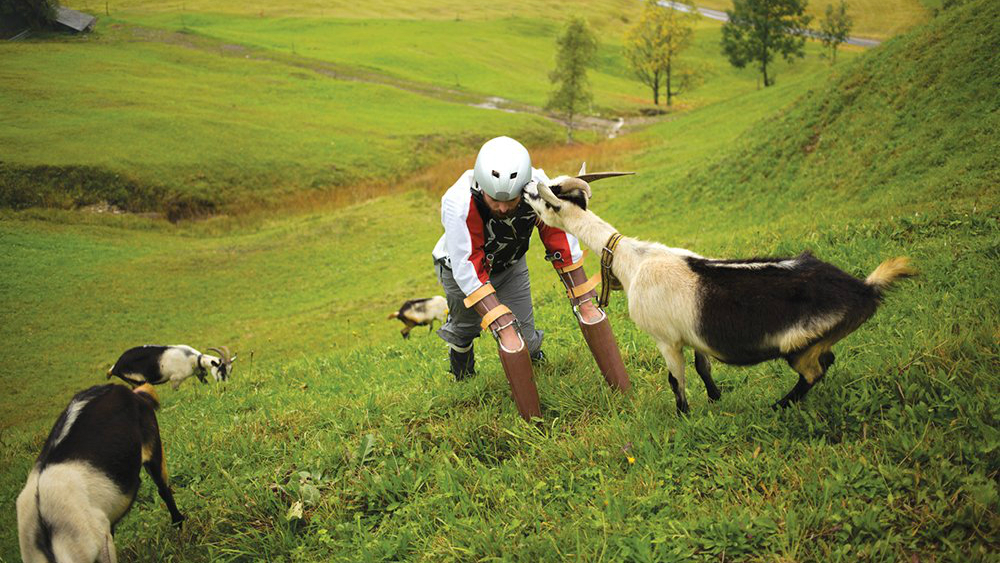Ig Nobel prize: 'Goat man' wins silly science award
Studies into trouser-wearing rats, people living as animals and coloured rocks all honoured in annual list

A free daily email with the biggest news stories of the day – and the best features from TheWeek.com
You are now subscribed
Your newsletter sign-up was successful
A man who spent three days in the Swiss Alps living as a mountain goat has received an Ig Nobel prize for the silliest scientific research.
Thomas Thwaites, 35, from London, strapped himself into prosthetic legs that enabled him to move like a goat for the project, which he described as "a holiday from being human".
While he recalled his time as a goat fondly, particularly bonding with a "goat buddy", he conceded that the whole idea was "bizarre."
The Week
Escape your echo chamber. Get the facts behind the news, plus analysis from multiple perspectives.

Sign up for The Week's Free Newsletters
From our morning news briefing to a weekly Good News Newsletter, get the best of The Week delivered directly to your inbox.
From our morning news briefing to a weekly Good News Newsletter, get the best of The Week delivered directly to your inbox.
Thwaites shared his biology prize with another Brit with a penchant for animal role-play. Charles Foster, a fellow at the University of Oxford, spent months living like as a variety of animals and was even chased by bloodhounds while mimicking a deer, according to Phys.org.
The Ig Nobel awards were inspired by the US science humour magazine, the Annals of Improbable Research, and have been handed out annually in a ceremony at Harvard University for 26 years. Winners receive $10trn – unfortunately, that's Zimbabwean dollars, which are currently almost worthless.
Although the experiments might sound ridiculous – and, in the case of the "goat man", look ridiculous too - "a lot of it - when examined closely - is actually intended to tackle real-world problems", the BBC reports.
How do you find out who wears in the trousers in a family of rats? Egyptian urologist Dr Ahmed Shafik set out to answer the question, managing to wrangle rodents into cotton, wool and cotton-polyester blend trousers "in order to study the garments' effects on their sex lives", the Daily Telegraph reports.
A free daily email with the biggest news stories of the day – and the best features from TheWeek.com
His conclusion – that the rats wearing polyester were less sexually active – is unlikely to alter the face of science, but it did earn Shafik an Ig Nobel prize.
Other winners at Thursday night's ceremony were a team of economists who studied the personality traits volunteers ascribed to different coloured rocks and a Swedish man who penned three novels about his passion for collecting hoverflies.
-
 6 of the world’s most accessible destinations
6 of the world’s most accessible destinationsThe Week Recommends Experience all of Berlin, Singapore and Sydney
-
 How the FCC’s ‘equal time’ rule works
How the FCC’s ‘equal time’ rule worksIn the Spotlight The law is at the heart of the Colbert-CBS conflict
-
 What is the endgame in the DHS shutdown?
What is the endgame in the DHS shutdown?Today’s Big Question Democrats want to rein in ICE’s immigration crackdown
-
 Epstein files topple law CEO, roil UK government
Epstein files topple law CEO, roil UK governmentSpeed Read Peter Mandelson, Britain’s former ambassador to the US, is caught up in the scandal
-
 Iran and US prepare to meet after skirmishes
Iran and US prepare to meet after skirmishesSpeed Read The incident comes amid heightened tensions in the Middle East
-
 Israel retrieves final hostage’s body from Gaza
Israel retrieves final hostage’s body from GazaSpeed Read The 24-year-old police officer was killed during the initial Hamas attack
-
 China’s Xi targets top general in growing purge
China’s Xi targets top general in growing purgeSpeed Read Zhang Youxia is being investigated over ‘grave violations’ of the law
-
 Panama and Canada are negotiating over a crucial copper mine
Panama and Canada are negotiating over a crucial copper mineIn the Spotlight Panama is set to make a final decision on the mine this summer
-
 Why Greenland’s natural resources are nearly impossible to mine
Why Greenland’s natural resources are nearly impossible to mineThe Explainer The country’s natural landscape makes the task extremely difficult
-
 Iran cuts internet as protests escalate
Iran cuts internet as protests escalateSpeed Reada Government buildings across the country have been set on fire
-
 US nabs ‘shadow’ tanker claimed by Russia
US nabs ‘shadow’ tanker claimed by RussiaSpeed Read The ship was one of two vessels seized by the US military